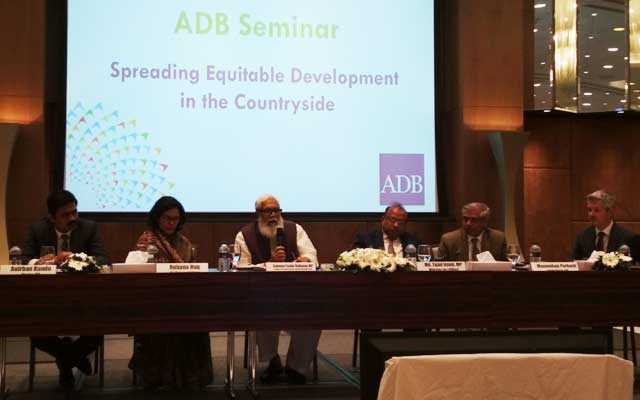ADB says Bangladesh can look up to Germany as a ‘possible model’ for decentralisation

Country Director of this Manila-based development bank Manmohan Parkash says Bangladesh needs a development model that promotes “equitable development” in the country – a model which is “inclusive, sustainable and resilient”.
“We researched and found that Germany is a possible model,” he said on Tuesday as the ADB organised a seminar on “spreading equitable development in the country’ bringing German expert Ralf Schuster, head of Bank Non-OECD Countries, Helaba, Germany.
LGRD Minister Md Tazul Islam, and Prime Minister’s Adviser for Private Industry and Investment Salman F Rahman were also present.
Schuster shared German development model which was achieved by decentralised demographic and industrial development, expanding SME financing and providing education, infrastructure and digitisation in local areas.
He said Germany manages to create job opportunities all over the country.
“You will find only four cities – Berlin, Hamburg, Munich and Cologne – with more than 1 million inhabitants,” he said, adding that “Germans find employments not only in big companies, but also in SMEs”.
“Even in small cities you will find good education and people need not to go big cities.” Schuster added that they have also dual education system – both apprenticeship and vocational education together.
“I am the product of dual education,” he said, among many other aspects of German development model.
On being asked about the feasibility of German model in Bangladesh, he said it took 200 years for Germany to come to this stage. “Each and every country needs its own model. You have to find your own model.”
The ABD country director said Bangladesh has made rapid development and it is also facing developmental challenges.
“The higher economic growth may not necessarily be benefitting all regions and sections of the society. The Gini coefficient is increasing and so is the disparity,” Parkash said.
“Almost 2 million new workers get added to the society annually. Then we have the challenges of infrastructure deficit, human capital, urban services, financial inclusion, climate change and resilience. The quality of life is getting affected.”
He said Bangladesh needs to diversify its economic base and create new sources of growth. And that diversification requires decentralised industrial development agenda. Spreading industries including SMEs in the countryside will also help develop lagging regions.
“Also the country needs to create a population with a higher employment potential by providing quality education and developing and upgrading the skills of the labour force.”
At this moment, Parkash said Bangladesh needs policy directions, infrastructure development, giving thrust on innovation and skills development, access to affordable finance and capacity building of institutions.
Salman Rahman, however, said Bangladesh cannot wait for 200 years for development and that there are many things that Bangladesh is already doing will ultimately lead to a German-style development.
“The process has already started. We have to do much faster than that,” he said, adding that “Our target is to be a developed country by 2041”.
In Germany, he said “the decentralisaiton did not take place in industries only, in fact the entire German society is decentralised”.
“Our prime minister has already mentioned that every village will be turned into a city. That’s exactly what the German model is -- you are going to take away the concentration from cities …you urbanise the whole country.”
With that in mind, Salman said, the government is building 100 special economic zones to take the concentration away from Dhaka and Chattogram.
The LGRD minister said they are working with the roadmap the prime minister has set up in the run-up to the Vision 2041 for being a developed country.
Source: https://bdnews24.com